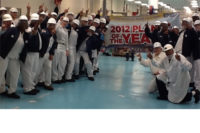Keeping employees happy
Castle, who used to play and coach ice hockey, said he likes to build teams and develop talent. Individuals and departments have to work together for the whole company to succeed. The Rhino Foods culture values teamwork. There are no silos, Castle said. The company is organized on relationships, not hierarchy. Management sets high expectations, communicates them companywide and focuses on achieving results.
An employee spends 2,000 hours a year on the job. When he or she has a good day in the office, that feeling carries over to a good day at home and vice versa, Castle said. While he demands a lot from his 135 employees, he gives a lot in return. Four employee programs that foster good relations in the workplace are:
• Open Book Management
• Working Bridges
• Employee Exchange Program
• Wellness and Health Action Team
To succeed, employees have to know what is going on within the company, and Castle holds nothing back. At monthly staff meetings, Castle opens up the financial books and shares everything, except individual salaries. Each month, Jayne Magnant, director of finance and administration, holds three meetings over the course of a day with different groups of employees to review progress and set goals. In meeting with Operations, for example, she might show how the department can control expenses by reducing overtime. First-time quality is another important metric, and employees learn the cost of re-work. Teams earn incentives (cash, gift cards or merchandise) when they meet goals.
Goal setting works. When Rhino Foods was measuring plant safety, it reduced recordable injuries in a three-year-period from three times the national average to below the average. The goals change over time so that employees are always focusing on something fresh. Long-time employees get a very good schooling in business practices and metrics, Castle said. One former employee set up his own grocery business.
Working Bridges is a collaborative initiative that helps employees become financially stable. It includes the emergency loan plan called the “Income Advance Program.” A credit union will disburse $1,000 within 24 hours for emergencies. Since initiating the program in 2008, Rhino Foods has dispensed $140,000; there has been one default. Typical uses for the loans are for car repairs, medical emergencies, home repairs or security deposits. The loan is paid back through payroll deductions. Participation in the program has another benefit: financial literacy. Once the loan is paid off, borrowers can choose to continue paying the deductions into a savings account. It’s the first nest egg or financial cushion some have ever had.
The employee exchange program, developed in 1993, is described as a “counter-seasonal” exchange intended to avoid seasonal layoffs. Rhino Foods employees go to work at other companies needing short-term labor. Rhino continues to pay the exchange employees on its payroll and invoices the exchange employer for the cost of the labor. One benefit to both parties is the exchange of best practices.
The health and wellness program helps employees lose weight or stop smoking and it encourages healthy habits, like eating better and exercising. It has improved employees’ health and reduced workers’ comp claims.
All these programs help to make Rhino Foods an employer of choice. It is in the best interests of any employer to retain the most skilled employees, especially when employment is high. The unemployment rate in Vermont was 5.2% in November 2012, well below the national rate of 7.7%. Even at the height of the recession, the state’s unemployment rate never exceeded 7.2%, according to the U.S. Bureau of Labor Statistics. The Burlington area has several other employers in the food processing industry, including Ben & Jerry’s (an ice cream unit of Unilever), Lake Champlain Chocolates (confectionary) and Green Mountain Coffee.
Keeping employees happy
Castle, who used to play and coach ice hockey, said he likes to build teams and develop talent. Individuals and departments have to work together for the whole company to succeed. The Rhino Foods culture values teamwork. There are no silos, Castle said. The company is organized on relationships, not hierarchy. Management sets high expectations, communicates them companywide and focuses on achieving results.
An employee spends 2,000 hours a year on the job. When he or she has a good day in the office, that feeling carries over to a good day at home and vice versa, Castle said. While he demands a lot from his 135 employees, he gives a lot in return. Four employee programs that foster good relations in the workplace are:
• Open Book Management
• Working Bridges
• Employee Exchange Program
• Wellness and Health Action Team
To succeed, employees have to know what is going on within the company, and Castle holds nothing back. At monthly staff meetings, Castle opens up the financial books and shares everything, except individual salaries. Each month, Jayne Magnant, director of finance and administration, holds three meetings over the course of a day with different groups of employees to review progress and set goals. In meeting with Operations, for example, she might show how the department can control expenses by reducing overtime. First-time quality is another important metric, and employees learn the cost of re-work. Teams earn incentives (cash, gift cards or merchandise) when they meet goals.
Goal setting works. When Rhino Foods was measuring plant safety, it reduced recordable injuries in a three-year-period from three times the national average to below the average. The goals change over time so that employees are always focusing on something fresh. Long-time employees get a very good schooling in business practices and metrics, Castle said. One former employee set up his own grocery business.
Working Bridges is a collaborative initiative that helps employees become financially stable. It includes the emergency loan plan called the “Income Advance Program.” A credit union will disburse $1,000 within 24 hours for emergencies. Since initiating the program in 2008, Rhino Foods has dispensed $140,000; there has been one default. Typical uses for the loans are for car repairs, medical emergencies, home repairs or security deposits. The loan is paid back through payroll deductions. Participation in the program has another benefit: financial literacy. Once the loan is paid off, borrowers can choose to continue paying the deductions into a savings account. It’s the first nest egg or financial cushion some have ever had.
The employee exchange program, developed in 1993, is described as a “counter-seasonal” exchange intended to avoid seasonal layoffs. Rhino Foods employees go to work at other companies needing short-term labor. Rhino continues to pay the exchange employees on its payroll and invoices the exchange employer for the cost of the labor. One benefit to both parties is the exchange of best practices.
The health and wellness program helps employees lose weight or stop smoking and it encourages healthy habits, like eating better and exercising. It has improved employees’ health and reduced workers’ comp claims.
All these programs help to make Rhino Foods an employer of choice. It is in the best interests of any employer to retain the most skilled employees, especially when employment is high. The unemployment rate in Vermont was 5.2% in November 2012, well below the national rate of 7.7%. Even at the height of the recession, the state’s unemployment rate never exceeded 7.2%, according to the U.S. Bureau of Labor Statistics. The Burlington area has several other employers in the food processing industry, including Ben & Jerry’s (an ice cream unit of Unilever), Lake Champlain Chocolates (confectionary) and Green Mountain Coffee.
Keeping employees happy
Castle, who used to play and coach ice hockey, said he likes to build teams and develop talent. Individuals and departments have to work together for the whole company to succeed. The Rhino Foods culture values teamwork. There are no silos, Castle said. The company is organized on relationships, not hierarchy. Management sets high expectations, communicates them companywide and focuses on achieving results.
An employee spends 2,000 hours a year on the job. When he or she has a good day in the office, that feeling carries over to a good day at home and vice versa, Castle said. While he demands a lot from his 135 employees, he gives a lot in return. Four employee programs that foster good relations in the workplace are:
• Open Book Management
• Working Bridges
• Employee Exchange Program
• Wellness and Health Action Team
To succeed, employees have to know what is going on within the company, and Castle holds nothing back. At monthly staff meetings, Castle opens up the financial books and shares everything, except individual salaries. Each month, Jayne Magnant, director of finance and administration, holds three meetings over the course of a day with different groups of employees to review progress and set goals. In meeting with Operations, for example, she might show how the department can control expenses by reducing overtime. First-time quality is another important metric, and employees learn the cost of re-work. Teams earn incentives (cash, gift cards or merchandise) when they meet goals.
Goal setting works. When Rhino Foods was measuring plant safety, it reduced recordable injuries in a three-year-period from three times the national average to below the average. The goals change over time so that employees are always focusing on something fresh. Long-time employees get a very good schooling in business practices and metrics, Castle said. One former employee set up his own grocery business.
Working Bridges is a collaborative initiative that helps employees become financially stable. It includes the emergency loan plan called the “Income Advance Program.” A credit union will disburse $1,000 within 24 hours for emergencies. Since initiating the program in 2008, Rhino Foods has dispensed $140,000; there has been one default. Typical uses for the loans are for car repairs, medical emergencies, home repairs or security deposits. The loan is paid back through payroll deductions. Participation in the program has another benefit: financial literacy. Once the loan is paid off, borrowers can choose to continue paying the deductions into a savings account. It’s the first nest egg or financial cushion some have ever had.
The employee exchange program, developed in 1993, is described as a “counter-seasonal” exchange intended to avoid seasonal layoffs. Rhino Foods employees go to work at other companies needing short-term labor. Rhino continues to pay the exchange employees on its payroll and invoices the exchange employer for the cost of the labor. One benefit to both parties is the exchange of best practices.
The health and wellness program helps employees lose weight or stop smoking and it encourages healthy habits, like eating better and exercising. It has improved employees’ health and reduced workers’ comp claims.
All these programs help to make Rhino Foods an employer of choice. It is in the best interests of any employer to retain the most skilled employees, especially when employment is high. The unemployment rate in Vermont was 5.2% in November 2012, well below the national rate of 7.7%. Even at the height of the recession, the state’s unemployment rate never exceeded 7.2%, according to the U.S. Bureau of Labor Statistics. The Burlington area has several other employers in the food processing industry, including Ben & Jerry’s (an ice cream unit of Unilever), Lake Champlain Chocolates (confectionary) and Green Mountain Coffee.







